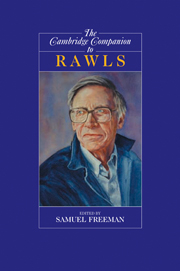Book contents
- Frontmatter
- Introduction
- 1 Rawls and Liberalism
- 2 For a Democratic Society
- 3 Rawls on Justification
- 4 Rawls on the Relationship between Liberalism and Democracy
- 5 Difference Principles
- 6 Democratic Equality
- 7 Congruence and the Good of Justice
- 8 On Rawls and Political Liberalism
- 9 Constructivism in Rawls and Kant
- 10 Public Reason
- 11 Rawls on Constitutionalism and Constitutional Law
- 12 Rawls and Utilitarianism
- 13 Rawls and Communitarianism
- 14 Rawls and Feminism
- Bibliography
- Index
2 - For a Democratic Society
Published online by Cambridge University Press: 28 May 2006
- Frontmatter
- Introduction
- 1 Rawls and Liberalism
- 2 For a Democratic Society
- 3 Rawls on Justification
- 4 Rawls on the Relationship between Liberalism and Democracy
- 5 Difference Principles
- 6 Democratic Equality
- 7 Congruence and the Good of Justice
- 8 On Rawls and Political Liberalism
- 9 Constructivism in Rawls and Kant
- 10 Public Reason
- 11 Rawls on Constitutionalism and Constitutional Law
- 12 Rawls and Utilitarianism
- 13 Rawls and Communitarianism
- 14 Rawls and Feminism
- Bibliography
- Index
Summary
JUSTICE AS FAIRNESS
John Rawls's A Theory of Justice tells us what justice requires, what a just society should look like, and how justice fits into the overall good of the members of a just society. But it does not tell us much about the politics of a just society: about the processes of public argument, political mobilization, electoral competition, organized movements, legislative decision making, or administration comprised within the politics of a modern democracy. Indeed, neither the term “democracy” nor any of its cognates has an entry in the index to A Theory of Justice. The only traditional problem of democracy that receives much sustained attention is the basis of majority rule, which is itself addressed principally in the context of a normative model of legislative decisions with an uncertain relation to actual legislative processes. This relative inattention to democracy – to politics more generally – may leave the impression that Rawls's theory of justice in some way denigrates democracy, perhaps subordinating it to a conception of justice that is defended through philosophical reasoning and is to be implemented by judges and administrators insulated from politics.
So it comes as something of a surprise when Rawls says, in the preface to the first edition of Theory of Justice, that his conception of justice as fairness “constitutes the most appropriate moral basis for a democratic society.” To be sure, the idea that justice as fairness has a particularly intimate democratic connection is prominent from the 1980 Dewey Lectures forward.
- Type
- Chapter
- Information
- The Cambridge Companion to Rawls , pp. 86 - 138Publisher: Cambridge University PressPrint publication year: 2002
- 32
- Cited by

